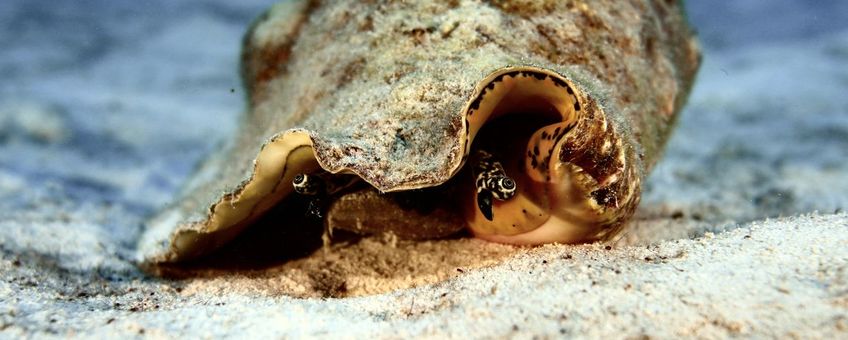
Queen Conch research shows promising results
World Wide Fund for Nature – NetherlandsThe research
 The Queen Conch (Aliger gigas) Hatchery in the Curaçao Sea Aquarium supplied the juvenile farmed conchs for the research. Some of the cultivated conchs first ended up in CARMABI‘s wet lab, which made its facilities available free of charge. In this wet lab it was evaluated how farmed and non-farmed conchs developed and behaved. The conchs were then released in small numbers with transmitters (tags) in seagrass fields near the Spanish Water. Seagrass beds are the best habitat for these snails. Queen Conch feeds on small algae and other organisms that live on the seagrass, which keeps the seagrass healthy. The released conchs were monitored via transmitters to analyze how they behave in nature and what their chances of survival are.
The Queen Conch (Aliger gigas) Hatchery in the Curaçao Sea Aquarium supplied the juvenile farmed conchs for the research. Some of the cultivated conchs first ended up in CARMABI‘s wet lab, which made its facilities available free of charge. In this wet lab it was evaluated how farmed and non-farmed conchs developed and behaved. The conchs were then released in small numbers with transmitters (tags) in seagrass fields near the Spanish Water. Seagrass beds are the best habitat for these snails. Queen Conch feeds on small algae and other organisms that live on the seagrass, which keeps the seagrass healthy. The released conchs were monitored via transmitters to analyze how they behave in nature and what their chances of survival are.
Results
Experiments were conducted on different seagrass beds: the native Turtle Grass and invasive species of seagrass. The ages of the conchs were also different, one and two year old conchs were released. The observations show that crabs eat a large number of one-year-old conchs and that the conchs (regardless of age) survive poorly in the rainy period and in extremely warm water. “The chance of survival is greater for two-year-old conchs because their thicker shell makes them not as sensitive to predators. We should also avoid the last three months of the year due to bad weather conditions. I am very curious to see what the research will reveal when we release farmed conchs into the ocean on Bonaire. It is already clear that further research is needed before we can proceed with large-scale restoration projects”, Michiel van Nierop explains.
Cooperation
The successful release of small Queen Conchs to strengthen the population is only possible through the cooperation of nature organizations, fishermen and the government. For example, permits must be applied for to transport farmed Queen Conchs by boat from Curaçao to Bonaire.  Fishing and eating Queen Conchs is very much woven into Caribbean culture and the discussion about this can be sensitive. That is why communication between the fishermen and the project remains important. To promote cooperation, an agreement has been signed between the fishing cooperatives on Curaçao and Bonaire, Federashon Kooperativanan Uní di Produkshon (FKUP) and PISKABON, STINAPA and WWF-NL. STINAPA is responsible for the supervision of the project.
Fishing and eating Queen Conchs is very much woven into Caribbean culture and the discussion about this can be sensitive. That is why communication between the fishermen and the project remains important. To promote cooperation, an agreement has been signed between the fishing cooperatives on Curaçao and Bonaire, Federashon Kooperativanan Uní di Produkshon (FKUP) and PISKABON, STINAPA and WWF-NL. STINAPA is responsible for the supervision of the project.
‘Conquer the Future’ receives financial support from WWF-NL and Seacology. WWF-NL’s Dutch Caribbean program is committed to strengthening coastal systems and making them resilient to threats such as climate change. Working with communities to preserve their cultures and improve their lives is the premise of Seacology projects.
Text: WWF-NL
Images: Jeffrey Bernus; Michiel van Nierop


